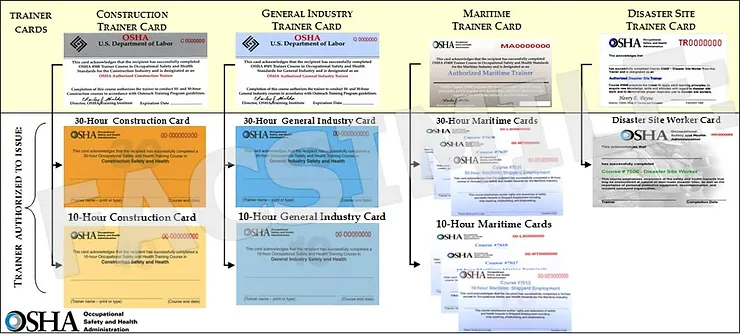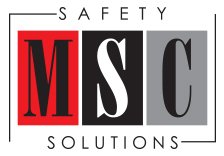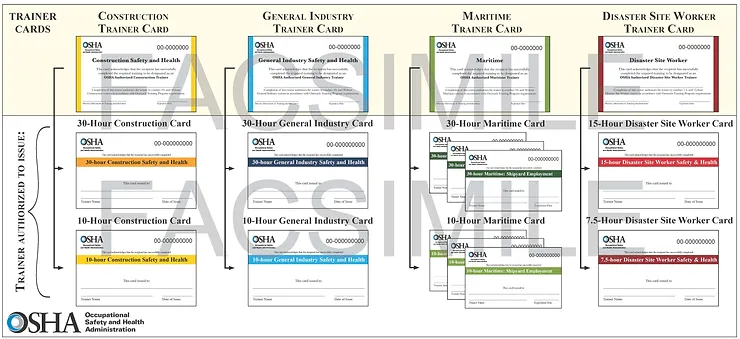Understanding OSHA Training Cards
OSHA training cards are issued to individuals who have completed OSHA Outreach Training Program courses, such as the OSHA 10-hour or 30-hour classes. These courses are designed to educate workers about occupational safety and health, covering topics such as hazard recognition, prevention, and worker rights.
Features of a Real OSHA Training Card
- Authorized Issuer Information:
- A genuine OSHA card will have the name of an authorized OSHA trainer or training provider.
- The card should include the training provider’s identification number.
- Course Details:
- The type of course (10-hour or 30-hour) and the topic covered (general industry, construction, maritime, or disaster site) will be clearly stated.
- The date of completion should be printed on the card.
- Official Design:
- OSHA cards have a specific design format with standardized logos, fonts, and layouts. Familiarize yourself with the appearance of a legitimate card by checking OSHA’s official samples available on their website.
- The card’s material is a durable plastic, similar to a credit card, which adds to its longevity and resistance to wear and tear.
- Security Features:
- Recent cards may include security features such as holograms or QR codes, which can be scanned to verify authenticity.
- Some cards include watermarking or microprinting, which are difficult to replicate accurately.
- Trainer Signature:
- A real OSHA card includes the signature of the trainer who conducted the course. This serves as confirmation that the course was completed under their supervision.
ISSUSED PROPR TO 3/1/16, OR FOR ONLINE TRAINING

ISSUSED AFTER 2/29/16
How to Spot a Fake OSHA Training Card
- Inaccurate Information:
- Check for misspellings, incorrect dates, or inconsistent details such as mismatched training provider numbers.
- Poor Print Quality:
- Fake cards often have poor-quality printing. Look for fuzzy text, off-center printing, or low-resolution images.
- Missing Security Features:
- Be suspicious of cards lacking security features, such as holograms or QR codes, especially if they are supposed to be from recent courses.
- Questionable Course Details:
- Verify the course type and completion date with the training provider if they seem unusual or implausible.
- Trainer Verification:
- Contact the training provider or check OSHA’s online database to verify the trainer’s credentials and the legitimacy of the card.
How MSC Safety Solutions Can Help
At MSC Safety Solutions, we understand the importance of OSHA compliance and the need for authentic training. We offer a range of OSHA training courses led by certified instructors to ensure that you receive the most up-to-date and comprehensive safety training available.
- Comprehensive Training Programs:
- We provide both OSHA 10-hour and 30-hour training courses tailored to specific industries, ensuring that all safety topics are covered thoroughly.
- Certified Instructors:
- Our instructors are fully certified and authorized by OSHA, guaranteeing that the training you receive is legitimate and of the highest quality.
- Verification Support:
- MSC Safety Solutions assists with verifying OSHA cards by providing access to our records and confirming the authenticity of training received through our programs.
- Ongoing Education:
- We offer continued education and refresher courses to keep your knowledge current and your skills sharp, enhancing workplace safety and compliance.
Conclusion
Ensuring the authenticity of an OSHA training card protects both employers and employees by maintaining a safe and compliant work environment. By familiarizing yourself with the features of a real card and knowing how to verify its authenticity, you can help prevent fraud and promote safety in the workplace. At MSC Safety Solutions, we are committed to providing reliable and effective training solutions to meet your safety needs. Always report any suspected fraudulent activity to OSHA to help combat the distribution of fake cards.





